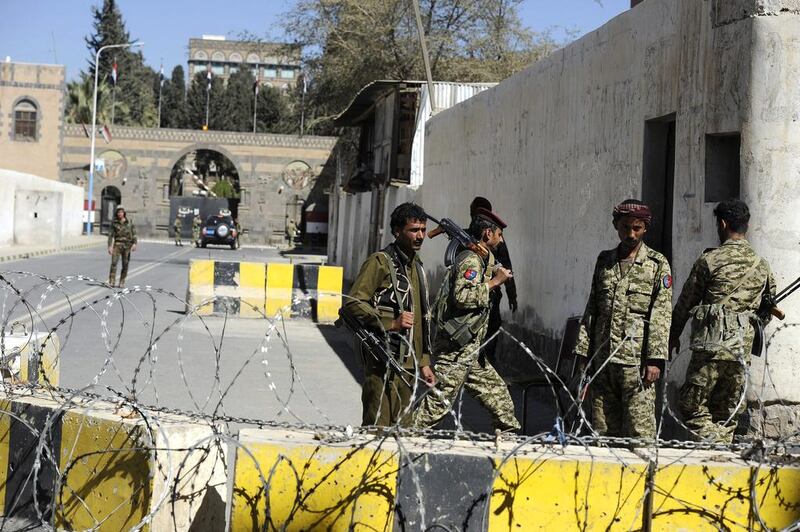Sanaa // Yemen’s Shiite Houthi militia on Saturday formed a “security commission”, consolidating its grip on power after a takeover denounced by opponents as a “coup” and condemned by the international community.
The declaration was followed by a blast outside the Houthi-controlled presidential palace, and a protest by thousands of people on the streets of Sanaa.
The GCC on Saturday condemned the Houthi takeover as a coup.
“The Houthi coup marks a grave and inacceptable escalation ... and endangers the security, stability, sovereignty and territorial integrity of Yemen,” the GCC said.
However, the Houthi chief Abdel Malek Al Houthi said he was open to participation with other parties.
“Our hand is extended to every political force in this country ... the space is open for partnership, cooperation and brotherhood and now everybody bears their responsibility for building, not destruction,” he said in a televised speech.
Gunmen loyal to the Shiite militia, which is also known as Ansarullah, fired into the air to disperse demonstrators in Yemen’s capital on Saturday and detained 17 of them.
It was a second successive day of anti-Houthi protests in Sanaa and other cities after the militia dissolved parliament and created a “presidential council” on Friday in a move it said was to fill a power vacuum.
The Shiite militia overran Sanaa in September and seized the presidential palace and key government buildings last month, prompting the president, Abdrabu Mansur Hadi and the prime minister, Khalid Bahah, to tender their resignations.
In its announcement on Saturday, the Houthis said Mr Hadi’s defence minister, General Mahmud Al Subaihi, would chair its newly formed security commission, which also included the outgoing interior minister.
The security commission “will lead the country’s affairs until the establishment of a presidential council,” the Houthis said in a statement published by official Saba news agency, which they seized in January.
But Gen Al Subaihi’s entourage suggested he was forced into accepting the post.
“We lost contact with him and we are concerned for his life,” said Abdel Aziz Mansour, an aide to the general, who is considered close to Mr Hadi.
The Houthis’ move on Friday to tighten its grip on power triggered angry condemnation from Yemen’s powerful Sunni tribes, who also branded it a coup.
On Friday the Houthis said they would set up a national council of 551 members to replace the legislature in the violence-wracked country, a key US ally in the fight against Al Qaeda.
The five-member presidential council would form a transitional government to govern for two years, they announced in a “constitutional declaration”.
The announcement came after a Wednesday deadline set by the militia for political parties to resolve the crisis passed with no agreement, and also included the creation of a “revolutionary council”.
UN envoy Jamal Benomar, who has been striving to seek a negotiated solution to the crisis, was back in Sanaa on Saturday and expected to meet members of the revolutionary council, Saba reported.
Friday’s declaration by the Houthis bore the signature of Mohammad Ali Al Houthi and described him as “the president of the revolutionary council”.
The council “will take all the necessary measures to defend the sovereignty of the nation, ensure its stability and security and guarantee the rights of citizens”, the declaration said.
The Houthis celebrated with fireworks in Sanaa and in the northern stronghold of Saada as protests erupted in the capital, second city Aden and third city Taez.
Influential tribal leaders in the oil-rich eastern province of Marib said they “rejected the authors of this coup”.
A US official, speaking in Munich after secretary of state John Kerry met leaders of Yemen’s Gulf neighbours, said the United States and the Gulf Cooperation Council “don’t agree” with the Houthi “presidential council”.
Liu Jieyi, president of the UN Security Council, said the body’s 15 members were ready to “take further steps” if negotiations to halt the unrest were not resumed “immediately”.
Yemen, which is also fighting an Al Qaeda insurgency, has been riven by instability since the Arab Spring-inspired uprising that forced autocratic president Ali Abdullah Saleh from power in 2012.
There has been no immediate reaction from Mr Saleh to the latest Houthi announcements, although he has been accused of backing the militia, as has Shiite-dominated Iran which also has not reacted.
* Agence France-Presse with additional reporting by Reuters





